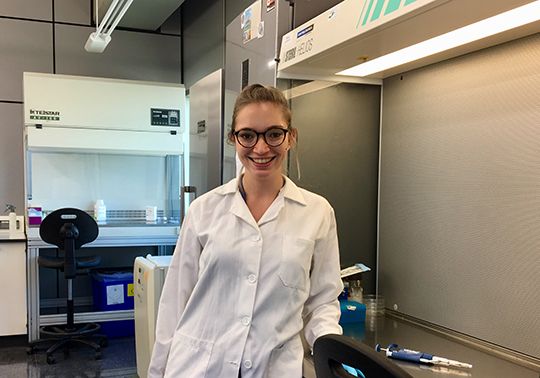
In addition to an undergraduate degree in Biochemistry and Biomedical Sciences, Kristie Tanner holds a Master’s degree in Research in Molecular and Cellular Biology and Genetics from the Universitat de València. She is currently enrolled in the Doctoral Program in Biomedicine and Biotechnology at the Universitat de València. In 2018, she was a fellow of the Real Colegio Complutense at Harvard (RCCH) and a Visiting Graduate Student at the Wyss Institute for Biologically Inspired Engineering at Harvard University. Her current work focuses on the study of microbiomes exposed to the sun (mainly solar panels and intertidal zones of the Mediterranean coast).
How did you learn about the RCCH?
I learned about the RCCH through the information session held in December 2016 at the Office of the Principal of the Universitat de València, where information was given about the fellowships for stays of UV members at the RCCH.
What made you apply for the RCCH long-term fellowship?
I applied because it seemed like a unique opportunity to spend time at such a prestigious institution as RCCH. In addition, I was aware of the work of a researcher at the Wyss Institute at Harvard on the design and creation of a continuous culture platform to perform experimental evolution. This was a topic of great interest to me in the framework of my doctoral thesis, which started in October 2016 and deals with bioprospecting and microbial ecology of high-insolation environments.
Could you tell us the main points of your research?
My research focuses on the study of microbiomes in high-insolation environments, in particular their ecology and potential applications. For the last few years, we’ve been studying the surfaces of solar panels, which are characterized by high doses of solar irradiation, as well as desiccation and temperature fluctuations. In order to survive on the surface of solar panels, microorganisms must have mechanisms to withstand these extreme conditions. For example, one of the mechanisms to survive irradiation is the accumulation of pigments.
With this in mind, we’ve been studying the following aspects. On the one hand, the microbial composition of solar panels from different geographical locations to determine whether the communities living in this particular habitat are similar regardless of location. Likewise, we’ve studied the colonization process of the solar panels and the production of pigments (especially carotenoids) by the microorganisms inhabiting the panels and their possible applications in antioxidants. Lastly, we analyzed the possibility of increasing carotenoid production through experimental evolution in laboratories by subjecting carotenoid-producing microbial strains to stresses [paper in preparation].
How did your stay at the RCCH contribute to your research?
My stay at the RCCH was truly productive. During my three months in Dr. Ahmad Khalil’s lab, I was able to not only use his continuous culture system to perform experimental evolutionary experiments on carotenoid-producing strains, but also to characterize the biome of Boston solar panels (from the Arnold Arboretum of Harvard University), both through massive sequencing and isolation of culturable microorganisms. In addition, among the species isolated in the lab, a new bacterial species stands out, which we’re currently characterizing in detail and hope to publish a paper on soon.
During your fellowship, you helped organize several UV webinars at the RCCH. Tell us about your experience in this regard.
It was a great experience because it allowed me to share the different aspects of my research with the members of the RCCH as well as with the scientific community in general. Moreover, I received very constructive and useful feedback to improve my experiments.
How would you rate your fellowship at RCCH overall?
I would rate it as very positive. It was a unique experience for me, not only scientifically but also personally, because I learned a lot and met many wonderful people who inspired me with their ideas.
What was the most positive aspect of your stay?
The most positive aspects were without a doubt the work I did and the people I met.
And the hardest part?
The hardest part was being away from home and loved ones.
Do you plan to repeat this experience?
The truth is that the experience was so good that I wouldn’t mind repeating it.
What would you say to those who are considering a fellowship like yours?
I’d encourage them to go for it because, as I said before, RCCH fellowships are a unique opportunity to stay in a prestigious environment and grow scientifically and personally.
What are your plans for the future?
At the moment, my future plans include completing my doctoral thesis, which is scheduled for the end of 2020.





